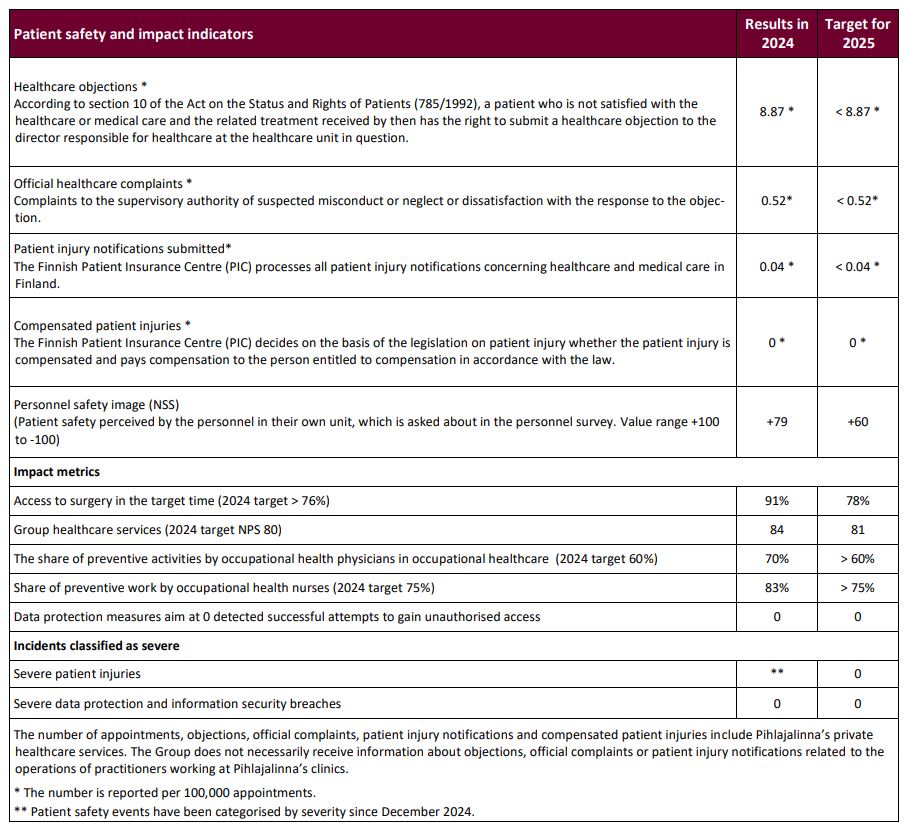Responsibility for health and wellbeing
Quality policy and quality management
Pihlajalinna’s quality policy and quality management system support the Group's strategy. The quality policy aims to ensure that the Group's operations comply with valid legislation, regulations issued by the authorities and any licences and requirements of the industry. Pihlajalinna's management is committed to compliance with the requirements and monitors the development of medical quality, customer experiences, employee satisfaction and process quality and takes the necessary action to achieve the quality-related objectives.
Pihlajalinna’s quality management is based on comprehensive self-monitoring, external quality assurance and comprehensive monitoring by the authorities. The Social Welfare and Health Care Supervision Act, which entered into force at the beginning of 2024, regulates the supervision of social and healthcare services, as well as the operating conditions, registration and self-monitoring of service providers. A service provider such as Pihlajalinna must prepare a self-monitoring programme for the tasks and services for which it is responsible. The programme describes how the service provider organises and implements its self-monitoring. The appendices to Pihlajalinna’s self-moni-toring programme include the Group’s pharmacotherapy plan, information security plan and environmental plan. The self-monitoring programme and plans are reviewed and updated annually or as necessary when there are changes in the activities or the operating environment. Self-monitoring makes it possible to quickly identify and address risks related to quality or safety. The self-monitoring programme and plan are available on Pihlajalinna’s website.
Fast and high-quality care chain
The objective of surgical operations is to implement a quick and high-quality chain of care, which Pihlajalinna continuously develops. The aim of the activities is to rehabilitate the customer as quickly as possible and to restore their work ability after the accident or surgery. Access to treatment, the duration of sickness-related absences and rehabilitation are monitored by means of various tools, which makes it possible to address deviations and comprehensively develop the operations. Access to treatment within the target time is an important indicator of the effectiveness of surgical operations and chain of care for accident insurance customers.
Hospital chief physicians monitor, report and correct overruns of the service promise times. The implementation of the service promise time is the regional responsibility of the chief physicians. The target and results are presented in the attached table.
Preventive healthcare
Pihlajalinna invests in services that can help to reduce prolonged sick-ness-related absences, permanent disability and human suffering as well as costs to the employer and society. The prevention of ill health is in everyone’s interest society-wise and helps to reduce costs in the long term. Focusing on prevention is a key objective, especially in occupational healthcare. This is monitored on a vocational group-specific basis. The target and results are presented in the attached table. The direction of development is correct and the results achieved are aligned with the targets. Pihlajalinna will continue to maintain good practices and actively monitor development needs in the future.
Customer experience
The results of customer experience measurements are used in the de-velopment activities of the entire Group in accordance with the cus-tomer experience management model. Pihlajalinna’s management (management teams, regional and business management) monitors the overall feedback through monthly and quarterly reports and is re-sponsible for development measures. In addition, consumers and end-users are regularly consulted and, on the basis of the feedback and suggestions received, Pihlajalinna develops its activities and sets targets and processes to monitor their progress. Customer experience is Pihlajalinna’s strategic focus, and measuring the customer experience and feedback process is part of the customer experience management model. The feedback process highlights topics for service development. The needs for quality development arising from the customer interface play a key role in the development of Pihlajalinna’s operations. Pihlajalinna follows high data protection prac-tices in its management model and feedback process. In addition to customer feedback provided proactively by the customer, Pihlajalinna measures the customer experience on a daily basis by means of various surveys, SMS or directly in the digital service channel.
Pihlajalinna uses the Net Promoter Score (NPS) to measure the customer experience, among others. In the sustainability report, Pihlajalinna reports the NPS results and targets for health services for the coming financial years. Healthcare services include primary care and specialised care services, both for private healthcare services and public services (clinic private services, surgical operations, remote consultations, services in wellbeing services counties). Healthcare ser-vices do not include wellbeing services or customer service (gym services, contact centre). The target and results are presented in the attached table.


